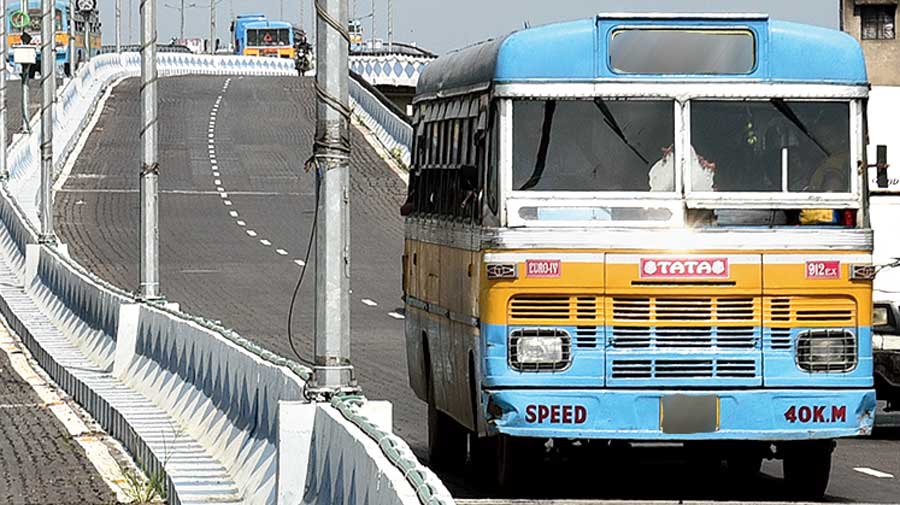Howrah station used to see 950,000 commuters travelling on suburban trains daily before the pandemic. And the bus terminus used to see close to 2,500 buses moving in and out till late at night.
On Wednesday, when suburban train services resume, a little over a 1,000 buses will be available outside the station complex to address the transport needs of the majority of close to 500,000 commuters expected to turn up on Day 1.
Most bus operators have withdrawn their buses from 60-odd routes ending at the bus terminus adjoining the station complex in Howrah.
On Tuesday, several of them told government officials they won’t be able to resume services “so soon”.
Many of their drivers and conductors have returned home to the districts in the past few months, several private bus operators said.
Owners have withdrawn their buses to cut down on losses. Some of these drivers and conductors have switched to other professions to fend for their families and things can’t be restored overnight, the operators said.
“How can it be done?” asked Tapan Bandyopadhyay of the Joint Council of Bus Syndicates. “Most bus owners have been incurring huge losses. Some have been unable to clear their dues. It is not possible to get back all members of our staff overnight and start running buses like before.”
The challenge of arranging transport for the tens of thousands of daily passengers travelling by local trains is not lost on the state government.
Sealdah station attracts close to 2 million suburban train passengers every day. Between Howrah and Sealdah, close to 3 million people use suburban trains for their daily commute.
A quarter of this figure on the first few days of the resumption of suburban train services will mean more buses have to be on the roads to cater to the demand, particularly between 8am and 11am and 4pm and 8pm.
“Unlike Howrah, there is no bus terminus outside Sealdah station. The station falls on close to 95 bus routes. We have requested private bus operators to increase the frequency of buses with each bus doing more trips to address the demand,” a transport department official, said.
On Tuesday, senior department officials had met representatives of private bus and minibus operators at Bhowanipore, Alipore, Barasat, and Barrackpore in an attempt to find a way to meet the transport demands of daily passengers.
There were no immediate promises, though.
By the time the state government waived taxes, many bus owners had already started paying fines for not renewing fitness certificates of their vehicles within the grace period, bus owners said.
The state government has not said anything regarding fitness certificates and fines.
“We have asked the transport department to frame a policy on the matter of fitness certificates and fines,” Rahul Chatterjee of All Bengal Bus Minibus Samanoy Samity said. “There are several owners who have fines running into several thousands. How will they bring out buses?”
The state government has decided that teams of transport officials will be outside stations from Wednesday to assess the demand-supply gap during rush hour and make arrangements accordingly.
“If the waiting time is too long, we will run state buses to address the problem,” an official said.










